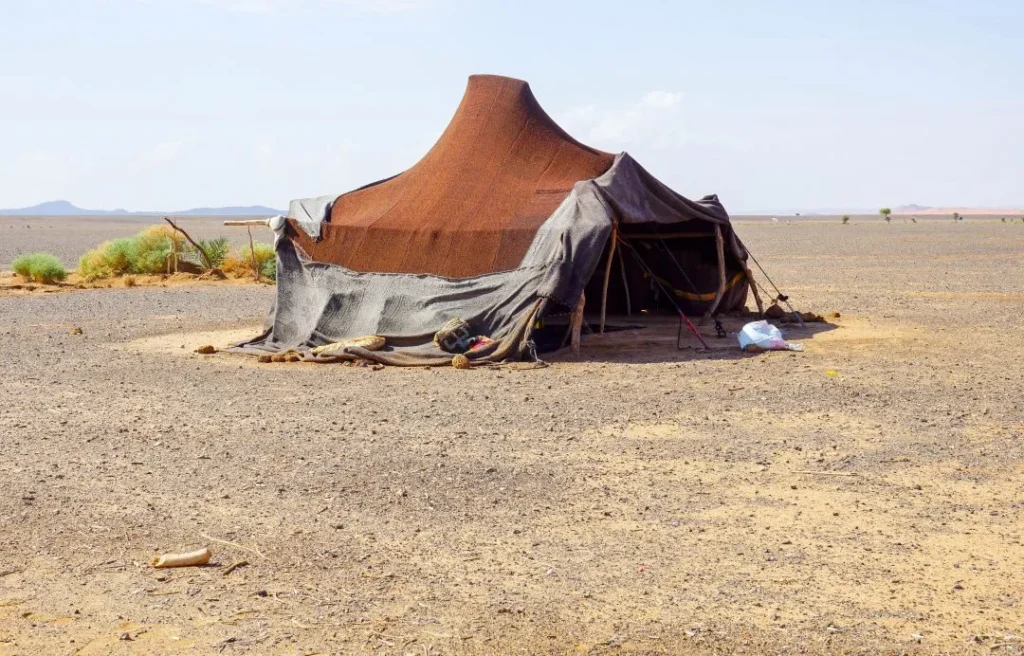In the sun-scorched expanses of the world’s deserts, nomadic tribes have carved out lives of resilience and adaptability. From the windswept dunes of the Sahara to the rugged terrains of the Gobi, these communities have harmonized ancient traditions with modern innovations, embodying a unique blend of heritage and progress.
A Life in Motion
Nomadic existence is defined by perpetual movement, dictated by the rhythms of nature. Families traverse vast landscapes, following seasonal patterns to ensure the survival of their livestock and themselves. Their dwellings, often tents crafted from animal hides or woven fabrics, are designed for swift assembly and disassembly, facilitating their mobile lifestyle.
Camels, revered as the “ships of the desert,” are central to this mobility, providing transportation and sustenance. These animals are not just beasts of burden but integral members of the nomadic family unit, symbolizing endurance and adaptability.

Traditions Woven into Daily Life

Cultural practices among desert nomads are rich and varied. Storytelling, music, and dance are not mere pastimes but vital means of preserving history and reinforcing communal bonds. Traditional attire, adorned with intricate patterns and symbols, conveys social status and tribal affiliation, serving both functional and expressive purposes.
Social structures are often patriarchal, yet women play crucial roles in maintaining cultural continuity and managing household affairs. Their contributions are essential to the community’s resilience and cohesion.
Embracing Modernity Without Losing Identity
While rooted in tradition, many nomadic communities have embraced aspects of modern life. Solar panels power essential devices, and mobile phones facilitate communication across vast distances. In Mongolia’s Gobi Desert, herders use motorcycles to manage livestock, illustrating a seamless integration of old and new.While rooted in tradition, many nomadic communities have embraced aspects of modern life. Solar panels power essential devices, and mobile phones facilitate communication across vast distances. In Mongolia’s Gobi Desert, herders use motorcycles to manage livestock, illustrating a seamless integration of old and new.
Education is increasingly valued, with efforts to provide learning opportunities without disrupting traditional lifestyles. This balance ensures that younger generations can navigate contemporary challenges while honoring their heritage.
Education is increasingly valued, with efforts to provide learning opportunities without disrupting traditional lifestyles. This balance ensures that younger generations can navigate contemporary challenges while honoring their heritage.
Challenges in a Changing World
Desert nomads face numerous challenges, including climate change, land degradation, and political instability. Rising temperatures and unpredictable weather patterns threaten traditional grazing routes and water sources. Globalization and modernization can lead to cultural erosion and displacement.
Despite these obstacles, many communities are finding innovative solutions. Engagement in sustainable tourism, handicraft production, and small-scale agriculture provides alternative income sources while preserving cultural practices.
Sustainable Tourism: A Path Forward
Eco-tourism offers a promising avenue for desert nomads to share their culture with the world. By hosting travelers and showcasing traditional lifestyles, communities can generate income and foster cross-cultural understanding. This approach promotes environmental conservation and cultural preservation, benefiting both hosts and visitors.
Travelers seeking authentic experiences are drawn to the simplicity and depth of nomadic life. Participating in daily routines, such as herding or cooking, provides insights into a world where harmony with nature is paramount.
The Enduring Spirit of the Nomad
Desert nomads exemplify human resilience and adaptability. Their ability to maintain cultural integrity while embracing necessary changes offers valuable lessons in sustainability and community. As the world grapples with environmental and social challenges, the wisdom of nomadic traditions holds relevance and inspiration for all.
Read More: Record Bliss Villa Sale Wows Dubai’s Luxury Market













